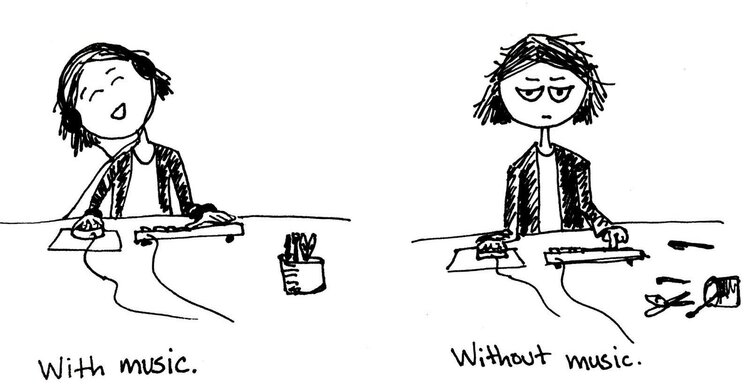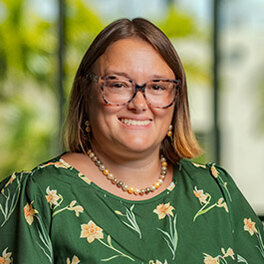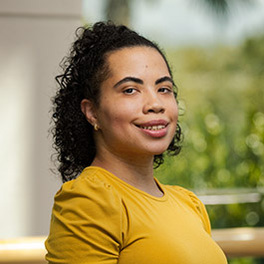Accessibility Options:
Welcome to the Music Therapy Research Methods Guide

Related Guides
-

-

-

Saily Marrero
Nursing & Health Studies, Biology, and Psychology Librarian
305-284-2040
Please provide a brief description of the topics or issues you would like to discuss during our consultation.
Ask-a-Librarian
uSearch
Music Therapy Titles

Directions to the Stacks
1) Go to the 2nd floor of Richter Library
2) If you're coming from the elevators go to your right. If you're coming from the stairs go straight toward the elevators across and take a left.
3) Look for the sign that says "Stacks Elevators" down the hall.
uSearch Help
Databases for Music Therapy
ERIC (ProQuest)
ERIC (Education Resources Information Center) is an authoritative database of indexed and full-text educational literature and resources. Essential for education researchers of all kinds, it features journals included in Current Index of Journals in Education and Resources in Education Index.
Music Index
The Music Index provides citations to scholarly and popular music journals and magazines, indexing more than 690 international music periodicals. Book reviews, reviews of music recordings, tapes, and performances are indexed.
PsycINFO
Abstracts of scholarly journal articles, book chapters, books, and dissertations, in behavioral science and mental health. Citations and summaries date back to early 1800s; journal coverage from 1887 to present. From the American Psychological Association.
Dissertations & Theses Global (ProQuest)
The world's most comprehensive collection of full-text dissertations and theses. Includes millions of searchable citations to dissertations and theses from 1861 to the present day together with over a million full-text dissertations that are available for download in PDF format. The database offers full text for most of the dissertations added since 1997 and strong retrospective full-text coverage for older graduate works.
Music Periodicals Database
Music Database (aka International Index to Music Periodicals Full Text ) indexes journal literature in all areas of music. Provides indexing and abstracts for more than 425 international music periodicals, plus full text for around 140 journals.
CINAHL Plus
Primary index to the international literature of nursing and health.
Embase
Embase is a comprehensive biomedical literature database that provides over 30 million abstracts and indices from published, peer-reviewed literature, in-press publications and conferences covering the most important international biomedical literature from 1947 to the present day.
Comprehensive index to the international literature of biomedicine including clinical practice, psychosocial issues, health care administration, medical research, nursing, and more.
RILM Abstracts of Music Literature
RILM Abstracts of Music Literature features content from the early 1800s through the present with some content coverage extending back as far as the late 18th century. Updated monthly, the database includes coverage of relevant articles from thousands of journals, many of which are not specifically devoted to music.
PubMed - US National Library of Medicine
Provides access to citations for biomedical articles from Medline and life science journals. Citations may include links to full-text articles.
Web of Knowledge
Web of Knowledge is a gateway providing cross product searching & integrated access to these services: Web of Science, Journal Citation Reports, Current Contents Connect, Web of Science Proceedings and Highly Cited.
Music Therapy Journals
Other Library Resources
The search results below are not exhaustive. There are many ways to search our catalog for resources relating to music therapy.
- Books and E-Books
- Theses and Reference (must be used in the library)
Music Therapy Organizations & Websites
American Music Therapy Association (AMTA): "AMTA's purpose is the progressive development of the therapeutic use of music in rehabilitation, special education, and community settings. AMTA is committed to the advancement of education, training, professional standards, credentials, and research in support of the music therapy profession." Florida is part of their South Eastern Region.
Creative Arts Therapies of the Palm Beaches (CATPB): Is a private music and art therapy practice, where therapists use the arts to addres a variety of issues located in West palm Beach, Florida.
Joyful Music Association (JMT): "The premiere provider of Music Therapy services in Central Florida" serving over 10,000 clients in the area.
Certification Board for Music Therapists (CBMT): Fully accredited by the National Commission for Certifying Agencies (NCCA), it is currently the only certifying board for music therapy at a national level.
The Academy of Neurologic Music Therapy (NMT Academy): They promote the advancement and use of evidence-based practice in Neurologic Music Therapy (NMT) internationally.
Prelude Music Therapy: "Our mission is to serve children and adults with special needs through sharing information; creating and publishing music therapy strategies; and giving workshops and presentations to professionals, parents, and students. "
Taylor Wright, 2025 Winner of the 3MT Competition
Taylor Wright (MM, Music Therapy, fall, 2025) is the first Frost graduate student to win the University of Miami's Three Minute Thesis (3MT) Competition. Founded by the University of Queensland, each student has a maximum of three minutes to present their research findings.Taylor's research poster, "Infant Directed Singing (IDS) and Same-Sex Fathers of Infants: Two Instrumental Case Studies" and the 3MT trophy are currently on display in the case on the ground floor of the Weeks Music Library.
The resources listed on this page were all used by Taylor to develop this research study for his Masters thesis.
Monographic Literature
Article Literature
Arnon, S., Diamant, C., Bauer, S., Regev, R., Sirota, G., & Litmanovitz, I. (2014). Maternal singing during kangaroo care led to autonomic stability in preterm infants and reduced maternal anxiety. ACTA Paediatrica, 103(10), 1039–1044.
Blood, A. J., & Zatorre, R. J. (2001). Intensely pleasurable responses to music correlate with activity in brain regions implicated in reward and emotion. Proceedings of the National Academy of Sciences - PNAS, 98(20), 11818–11823.
Cirelli, L. K., Jurewicz, Z. B., & Trehub, S. E. (2020). Effects of maternal singing style on mother–infant arousal and behavior. Journal of Cognitive Neuroscience, 32(7), 1213–1220.
Creighton, A. L., Atherton, M., & Kitamura, C. (2013). Singing play songs and lullabies: Investigating the subjective contributions to maternal attachment constructs. Australian Journal of Music Therapy, 24, 17–47.
Delavenne, A., Gratier, M., & Devouche, E. (2013). Expressive timing in infant-directed singing between 3 and 6 months. Infant Behavior & Development, 36(1), 1–13.
de l’Etoile, S. K. (2015). Self-regulation and infant-directed singing in infants with Down Syndrome. Journal of Music Therapy, 52(2), 195–220.
Family equality. (2019). LGBT Family Planning Survey. Retrieved March 5, 2024.
Fancourt, D., & Perkins, R. (2018). The effects of mother–infant singing on emotional closeness, affect, anxiety, and stress hormones. Music & Science, 1, 1-10.
Farr, R. H., & Vazquez, C. P. (2020). Stigma experiences, mental health, perceived parenting competence, and parent–child relationships among lesbian, gay, and heterosexual adoptive parents in the United States. Frontiers in Psychology, 11, 445-.
Koelsch, S. (2020). A coordinate-based meta-analysis of music-evoked emotions. NeuroImage, 223, 117350–117361.
Newman, L. J., Stewart, S. E., Freeman, N. C., & Thompson, G. (2022). A systematic review of music interventions to support parent-child attachment. Journal of Music Therapy, 59(4), 430–459.
Persico, G., Antolini, L., Vergani, P., Costantini, W., Nardi, M. T., & Bellotti, L. (2017). Maternal singing of lullabies during pregnancy and after birth: Effects on mother–infant bonding and on newborns’ behaviour. Concurrent Cohort Study. Journal of the Australian College of Midwives, 30(4), e214–e220.
Perrin, E. C., Hurley, S. M., Mattern, K., Flavin, L., & Pinderhughes, E. E. (2019). Barriers and stigma experienced by gay fathers and their children. Pediatrics, 143(2).
Sharman, K. M., Meissel, K., Tait, J. E., Rudd, G., & Henderson, A. M. E. (2023). The effects of live parental infant-directed singing on infants, parents, and the parent-infant dyad: A systematic review of the literature. Infant Behavior & Development, 72, 101859-.
Trehub, S. E., Unyk, A. M., Kamenetsky, S. B., Hill, D. S., Trainor, L. J., Henderson, J. L., & Saraza, M. (1997b). Mothers’ and fathers’ singing to infants. Developmental Psychology, 33(3), 500–507.
Wulff, V., Hepp, P., Wolf, O. T., Fehm, T., & Schaal, N. K. (2021). The influence of maternal singing on well-being, postpartum depression and bonding – A randomised, controlled trial. BMC Pregnancy and Childbirth, 21(1).







